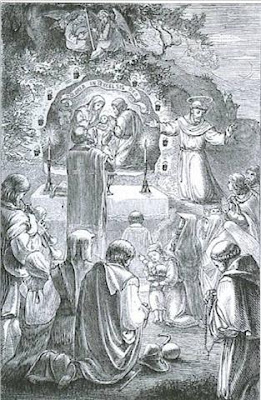To keep from saying the same things again though I Googled "Keep the Mass in Christmas. The first result was a very poignant essay by a priest on the Greek Orthodox Metropolis of Detroit website. It was all very well written, but I think the following passage really got to the central point:
Christmas is not first of all a day, but a doing: it is the Eucharistic worship that Christians offer in honor of the birth of their Savior. For those who have linguistic curiosity, Christmas is not the only -mas in the English language: there is also Marymas (August 15), Candlemas (February 2), Michaelmas (September 29), Martinmas (November 11), and Allhallowmas (November 1).Without the Eucharist the Christian celebration and worship fall short. I feel sad for our Protestant brothers and sisters who do not have this most precious Gift for the nourishment and salvation of our souls.
But if we say “Keep the Mass in Christmas,” the point is this. Christmas isn't really Christ-mas without the Mass, without the Divine Liturgy. Christmas isn't Christmas if we don't make a point of coming together on the appointed day, with all the people of God, to observe the commandment that He gave, “Do this in remembrance of Me.” Christmas isn't Christmas if we don't share the Eucharistic meal of His Body and Blood with one another in the Church. How is Christmas complete without receiving your most important gift?
Christ came to earth, not simply to be born in a lowly stable in Palestine, but to be born into the humble stable of the soul of each one of us. Through the sacraments He enters into our persons so that, as the Apostle Paul says, Christ is formed in you; and with Christ in you, you have the hope of glory.
Keep the Mass in your Christmas! Of course you should get together with family and friends. Of course you should open your presents around the tree. Of course you should enjoy your eggnog and mulled wine and ham and turkey and roast beast.
But don't forget the Mass! Don't skip the Liturgy! Don't leave out Holy Communion. If you do so, you are missing the real Christmas altogether. Come to church and worship the newborn King in the way that he Himself commands, by eating His Body and drinking His Blood. Keep the “Mass” in Christmas, and you will never lose “Christ” from your Christmas either.
How much more of a personal relationship can you have with God than to receive Him, the Lover of mankind, physically and spiritually into your body and soul in the Eucharist? You are what you eat after all. We unite ourselves to Christ Jesus in the Eucharist and all the faithful through him.
Song of Songs describes our Creator seeking after us like a lover and in the Flesh and Blood He offers to us in the Eucharist, the Flesh and Blood that came into the world on Christmas Day, He consummates that love for mankind.
May God bless all who read my ramblings,

Adopt A Catholic Blog








